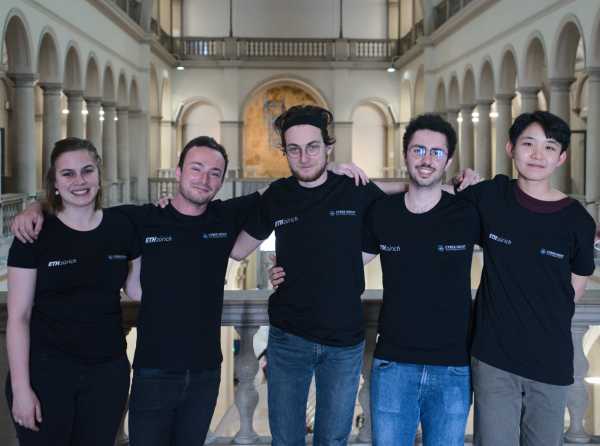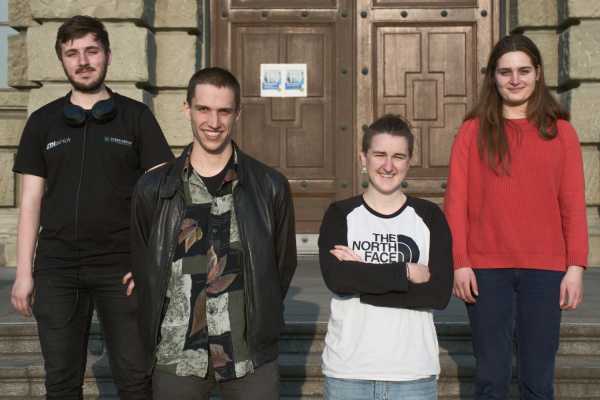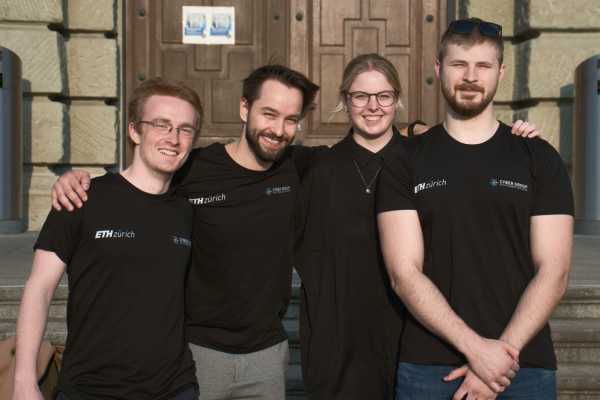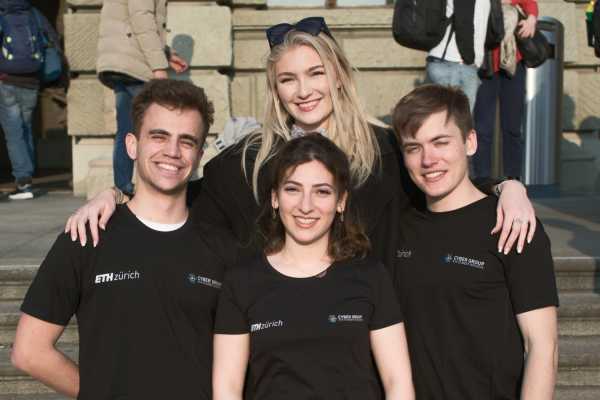Fantastic performance by ETH teams in the Geneva Cyber 9/12 Strategy Challenge 2022
Thirty international teams competed virtually in the Geneva Cyber 9/12 Strategy Challenge 2022, including two teams of ETH students. Both made it all the way to the finals, winning second and fourth place, and a special prize. Before the competition, all students went through a rigorous two-month training programme provided by the student organisation Cyber Group.
All is well in the small fictional African country of Nistria, despite some geopolitical tensions with its neighbouring countries. Suddenly, satellite communications begin to fail. Mobile payments – which are used almost exclusively in the region – become unreliable, bank runs are starting and major mining operations that rely on satellites are forced to a halt. Soon, misinformation on social media is sky-rocketing, and social unrest and military tensions are rising. How can you safeguard the livelihoods and security of the population, and prevent this crisis ending in tragedy?
This was the scenario created by the Geneva Centre for Security Policy (GCSP) for the Cyber 9/12 Strategy Challenge 2022. In this international competition, interdisciplinary teams of four students each face a simulated cyber incident. Over two days, they must analyse the situation, develop their policy recommendations, and present them in front of high-ranking decision-makers. As the competition unfolds, the scenario keeps evolving and worsening, just like in real life.
Thirty student teams from all over the world competed in this year’s challenge. Once again, ETH teams participated in the competition with great success. After two months of intensive weekly training offered by the student organisation Cyber Group, Team Lémanners and Team Soteria made it all the way to the finals, winning second and fourth place, respectively. Team Soteria also received the “Most Creative Policy” award. A fantastic success due to a solid technical foundation, cemented by a strong team spirit and augmented by strong policy and soft skills!
Thorough preparation for a tough competition
This year’s edition was particularly formidable: a fierce competition between 30 teams from universities around the world, a stringent selection procedure and a very complex scenario made for a tough competition. So much so that teams ETHernal and Shadow Eagles had to yield before the first round due to the tough selection procedure of GCSP. Nevertheless, together with the two teams who qualified, they all successfully completed the Cyber Group training programme and mock competitions, and developed their cyber security skills.




The teams had a strong ally at their side – Cyber Group. This student organisation was founded by participants of the 2019 Geneva Cyber 9/12 Challenge with the goal of comprehensively preparing future participants from ETH Zurich for the competition. Since the establishment of Cyber Group, ETH teams trained and supported by them have secured top places and special awards at the Geneva competition every year.
Starting back in February, Cyber Group assembled 16 interested ETH students into 4 teams, provided them with weekly 4-hour training sessions, and assisted them with funding and experienced coaches. During the training, the participants learned about cyber security politics and policy, international cyber law and incident response, as well as communication and oratory skills.
Christian Knabenhans, Cyber Group President, is amazed at the determination and drive of the teams. “It was wonderful to see all these students progress and grow throughout the training,” he says. “We were really proud to see them honing their skills, gaining in confidence and forming tight-knit teams, session after session.”
Marina Ivanović, Cyber Group Board Member and Taskforce Lead, is delighted that so many experts were willing to give their time and knowledge to the organisation. “Our training once again proved that when enthusiastic students engage with cyber experts from industry, the public sector and academia, we can all grow together and achieve great results. I strongly believe that one of the main ingredients to this year’s success was the passion and expertise shared by cyber security specialists with our teams,” she says. “I would like to thank our numerous experts, who supported us throughout the training. Special thanks go to ETH Zurich, Professor Kenny Paterson from the Applied Cryptography Group at the Department of Computer Science, and the team of researchers from the Center for Security Studies.”
First joint ETH-EPFL team
For the first time, Cyber Group also supported a joint team composed of students enrolled simultaneously at ETH Zurich and EPFL in Lausanne. Of the four competitors, three are enrolled in the Joint Master’s in Cyber Security, recently created by both universities, and the fourth team member is finishing her Master’s at ETH while doing an exchange in Lausanne.
“As a student-led organisation, we pride ourselves on helping our fellow students explore the world of cyber security. So when the exchange students from Lausanne attended our events in the autumn semester and got very excited about Cyber 9/12, we knew we wanted to make that happen for them,” says Cyber Group Board Member Matthias Franke. “Our hope was to fully support them in becoming a tight-knit team and luckily we were able to bring the four of them together in Lausanne so they could attend the training sessions remotely.”
“We were proud to see our students honing their skills, gaining in confidence and forming tight-knit teams.”Christian Knabenhans, Cyber Group President
Cyber Group ran all training sessions in a hybrid mode, broadcasting live from Zurich to Lausanne. “Our hybrid setup not only allowed frictionless collaboration between students at both locations in Switzerland, but it also enabled cyber security experts from abroad to join us. We are very grateful for the numerous experts from Germany, the Netherlands and even as far as the US who gave their time to train our students,” says Thore Göbel, Head of Public Sector Outreach. “Our experience with this hybrid mode, enabled by camera and microphone equipment provided by ETH’s media services, was very positive. It has greatly lowered the bar for collaboration and knowledge sharing across geographical locations.”
Enthusiasm, creativity and teamwork
During the two-day challenge, creativity and teamwork were essential qualities. The teams were confronted with a trove of information, with varying levels of certainty and relevance, which they had to quickly process and analyse in order to make strategic, or even creative decisions. Team Soteria was especially inventive in their response, earning them the “Most Creative Policy” award and proving that thinking outside the box is sometimes the best way to tackle extraordinary problems.
This year’s edition of the Geneva Cyber 9/12 Strategy Challenge also posed an additional challenge to the teams: while the Geneva competition has historically dealt with European cyber-crises, this year’s scenario focused on the African continent, with global implications. This, of course, affected the training, pushing Cyber Group to mobilise its networks to get insights from experts in African cyber security and aspects of international cyber security.
“We congratulate all our teams and are incredibly proud of them,” says Andra-Maria Ilieș, Head of Digital Presence at Cyber Group. “And we want to thank all our experts and ETH Zurich once again for their constant support, as well as the Geneva Centre for Security Policy and the Atlantic Council for hosting this great event and for always providing thought-provoking scenarios with a twist. See you again next year!”
About Cyber Group
As an ETH student association, Cyber Group aims to bring the topic of cyber security closer to students from all study programmes, and create a network between students, academia, industry and the public sector. Its primary goal is to support student groups participating in cyber crisis simulation competitions, by providing them with appropriate training, funding and overall support during the competition.
Additionally, Cyber Group organises a variety of “Open Port” events throughout the year, during which renowned cyber security experts come to ETH to share the current state of their field with students. Cyber Group also organises an annual “Meet & Greet”, a networking event for cyber enthusiasts from all study programmes and areas to socialise and enjoy an evening of talks.
Learn more about Cyber Group at cybergroup.ethz.ch!
About the challenge
The Cyber 9/12 Strategy Challenge is an international student competition organised by the Geneva Centre for Security Policy and the Atlantic Council. It is designed to provide students from a range of academic disciplines with a deeper understanding of the policy challenges associated with an escalating cyber incident and a potential cyber conflict. Part interactive learning experience and part competitive scenario exercise, it challenges teams to respond to a realistic, evolving, multinational cyber security incident. Competitors must analyse the threats posed to national, international, and private sector interests. Students and professionals have a unique opportunity to interact with expert mentors and high-level cyber professionals while developing valuable skills in policy analysis and presentation.
Learn more about the Cyber 9/12 Strategy Challenge 2022 on the external page GCSP website.
